The first row is for desktop, and second row is for Tab and Mobile.
You can right click on this text and use Navigator for easy editing. This text message is hidden on all screens using Advanced/responsive tab on left.
The first row is for desktop, and second row is for Tab and Mobile.
You can right click on this text and use Navigator for easy editing. This text message is hidden on all screens using Advanced/responsive tab on left.
The JOURNEY UNTILL NOW
Xavier Board of Higher Education in India was established in May 1951, by eminent educationists of that time at a meeting held at St. Joseph’s College, Bangalore. Bishop Severin, the then Chairman of the CBCI Commission for Education, blessed the endeavor of the pioneering stalwarts to create a national organization to federate the welfare of Catholic Institutions affiliated to Universities in India. Fr. Jerome D’Souza SJ; Fr. M. M. Balaguer SJ; Fr. T. A. Mathias SJ; Fr. Kalacherry; Fr. Herbert D’Souza; Dr. Fr. John Vallamattam; Dr. C. M. Francis; Prof. V. V. John; Dr. Fabian Fernandes; Dr. Alfred Mascarenhas; Fr. P. C. Mathew SJ; Dr. Fr. Joseph Xavier SJ; Prof. Varghese Vazhappilly; Fr. Joseph Puthenpura CMI; Fr. Leslie Moras, Fr. Antony Arackal and Prof Fr L Joji Reddy SJ, took the lead to bring together all the Catholic Colleges in India, and to Co-ordinate their activities to uphold Excellence, Gospel values and True leadership through higher education. They visualized that the people of our country in an Independent India must be imbued with excellent skills and human values, as well as committed to national development. Following is the extract taken from the Diamond Jubilee Souvenir by Dr. Alfred Mascarenhas, President, Xavier Board (1995 – 2001)
1954 – 1961
From 1951 to 1960, constant endeavor to define and deepen the objective of Xavier Board was made, which at that time centered mainly on discussing the thrust of Catholic Higher Education Institutions, and writing the Constitution.
In 1954, a course on religious instruction “History of Salvation” was launched and the thrust was towards building religious and moral instruction with training of teachers and dialogue with the Government. During the years 1951 to 1960, the Xavier Board received warm appreciation and encouragement from the Church authorities. The Govt. of India frequently consulted XB on important matters such as Women’s education, NSS for Students, Health service in educational Institutions etc.
1962 – 1974
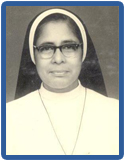
From 1962 to 1974, with Sr. Moira AC as Secretary and the Secretariat in Mangalore there was an increase in the number of Colleges to 73. There was great collaboration with the AICUF. Through the sessions of Vatican II, there was a shift towards participation and witnessing and strengthening the values of large numbers of Students of other faiths in our Colleges. Preliminary discussions were held towards a Chair of Theology in one of our Universities. A course on Theology was started in May 1967 and a course on Marriage and Family problems too. Xavier Board fostered the birth of the ecumenical sister organization AIACHE in 1967 and decided to work in collaboration with it. In 1970, Xavier Board encouraged the Colleges to undertake self-assessment leading to designing of new programs. Special efforts were made towards the Teaching of Religion. Attention of the Colleges was drawn towards the rights of minorities being contravened by some Universities. In 1973, attention was drawn to the task of religious and moral education, which formed the major concern of Xavier Board. A first version of the Constitution was approved in 1974, stressing more on regional and a search for social justice through education.
1975 – 1988
The next phase, with Sr. Hedwige AC as the Secretary celebrated the Silver Jubilee of the Xavier Board in 1976 and after rethinking and reflection defined the goal of Xavier Board towards the Catholic mission, focusing on spiritual programs, retreats and prayer groups. Family Life Education programs were conducted as a part of moral education. Scripture study and training courses for staff and students were instituted. Xavier Board headquarters was moved to Bangalore and the Board was registered under the Societies Registration Act in 1985.
Xavier Board kept vigilance over minority rights of educational institutions and filed an intervention in the Supreme Court together with other Institutions. The Membership increased to 125 Colleges. New premises were purchased for the permanent Secretariat of the Xavier Board.
At various points in time, consultations and discussions were held on relevance of the Xavier Board and the need not to duplicate the programs conducted by AIACHE.
1989 – 1995
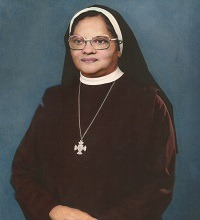
The fourth phase from 1989 to 1995 was guided by Sr. Stella Maria CMC followed by Dr. Sr. Helen Vincent FMM as the Secretaries. Through project funds, Special Youth programs were initiated and projects in 70 Colleges were subsidized. A new project on “Non Formal Education of Women” was developed for deprived women from rural and urban poor sectors. Over 75 Faith Formation projects were conducted in Colleges.
1990 – 1994
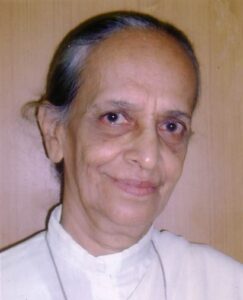
Dr. Sr. Helen Vincent FMM, former Principal (1978 – 1990) and Secretary of Stella Maris College (Autonomous), Chennai was a visionary leader, a dynamic educationalist and a committed religious who belonged to the congregation of the Franciscan Missionaries of Mary (FMM). She was one of the Executive Committee Members of Xavier Board when it was registered as a Society in September 1985 under the Karnataka Societies Registration Act, 1960. Later, after her retirement as Principal from Stella Maris College (Autonomous), Chennai, she served Xavier Board of Higher Education in India as Secretary from 1990 – 1994, with dedication and commitment.
Sr. Helen Vincent was associated with Xavier Board as Executive since 1976 onwards. It was almost different in 1990 when she took over with only 45 regular members & a cash balance of Rs. 60,000/-. It was uphill struggle and Sr. Helen left it with 120 members and a deposit of Rs. 10 lakhs. She had done her little to keep the good work going as she had great respect, regard & loyalty to Fr. M. M. Balaguer SJ, who was the founder.
1995 – 2000
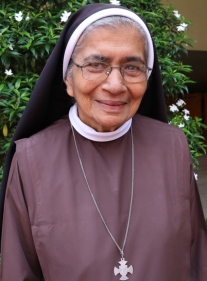
The fifth phase from 1995 to 2001 with Sr. Ezechiel CMC and Sr. Beatina Mary OSM as Secretaries, started with redefining the thrust areas at the Goa meeting as faith formation for both Students and Teachers.
* Respect for life issues
* Non formal education and empowerment of women
* Environment consciousness and education
* The National Youth Campus Ministry was supported in their programs in North and South India and at the National Campus Meet
* Regional meeting were stimulated and conducted in many regions, where issues of regional importance were discussed
* An Annual National Student essay competition was instituted and prizes awarded
* Three Annual Student Scholarships on means cum merit basis were instituted and distributed each year
* The project on “Non Formal Education of Women” continued in 40 selected Colleges spread in all 8 regions of the country where College Students and Staff stepped out of their campuses to help disadvantaged women towards literacy, education and empowerment
* Regular annual youth camps were conducted which have been highly successful. Faith formation programs were financed in many Colleges all over India. Regular annual Board Meetings were held by rotation at different places in the country.
2001 – 2004
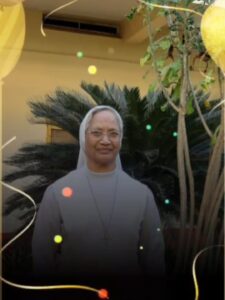 Dr. Sr. Marietta Pudota
Dr. Sr. Marietta Pudota
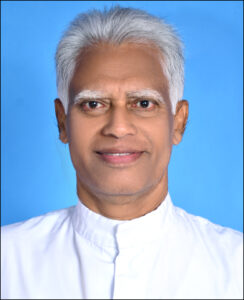
2011 – 2014
Between 2010 and 2013, Fr. Dhanapaul, SJ, served as the Secretary General of the Xavier Board of Higher Education in India (XBHEI), a period marked by his unwavering commitment to the advancement of Catholic higher education in the country.His leadership was characterized by a series of transformative initiatives that not only enhanced the administrative framework of the Board but also enriched the academic and spiritual experiences of its member institutions.
Understanding the importance of digital presence in the modern era, Fr. Dhanapaul took a significant step towards modernizing the Board’s operations by initiating the development of the Xavier Board’s official website.This platform served as a vital communication tool, facilitating seamless interaction among member colleges, providing updates on Board activities, and offering resources that supported the academic and administrative functions of the institutions.
Under his stewardship, the Xavier Board instituted an annual essay competition aimed at fostering critical thinking and scholarly expression among students.This initiative encouraged students to engage with contemporary issues, articulate their perspectives, and contribute to the intellectual vibrancy of Catholic higher education in India.The competition not only honed the writing skills of participants but also instilled a sense of responsibility and awareness regarding societal challenges.
Demonstrating a deep commitment to academic excellence and social justice, Fr. Dhanapaul introduced scholarships for deserving students.These scholarships were designed to alleviate financial burdens, enabling meritorious students from economically disadvantaged backgrounds to pursue higher education without hindrance.By investing in the potential of these students, the Board under his leadership contributed to the cultivation of future leaders who are both academically proficient and socially conscious.
Recognizing the importance of collaboration and dialogue, Fr. Dhanapaul revitalized the Triennial Conference of the Xavier Board.These conferences served as platforms for educators, administrators, and students to come together, share insights, discuss challenges, and deliberate on strategies for the advancement of Catholic higher education.The conferences fostered a sense of community and collective purpose, reinforcing the Board’s mission of excellence, gospel values, and leadership.A Legacy of Vision and Service.
Fr. Dhanapaul’s tenure as Secretary General was characterized by a harmonious blend of tradition and innovation.His initiatives not only modernized the administrative framework of the Xavier Board but also enriched the educational and spiritual experiences of its member institutions.His legacy continues to inspire and guide the Board’s mission of excellence, gospel values, and leadership in higher education.
2015 – 2021
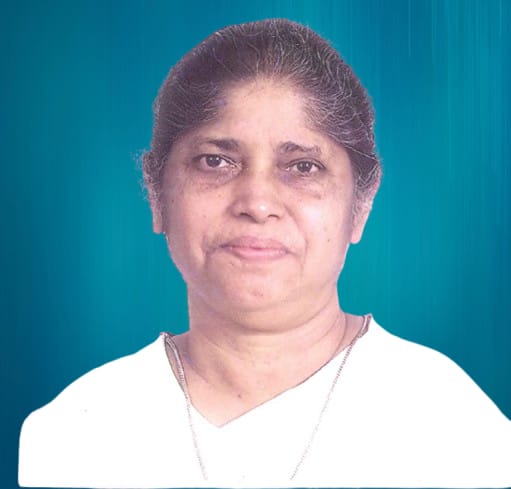 Dr Sr Annamma Philip, FMM, a luminous beacon of wisdom and leadership, served the Xavier Board of Higher Education in India with unwavering devotion and quiet strength for six transformative years, from 2015 to 2021. Her tenure as Secretary General from 2015 to 2021 marked an era of visionary reforms and compassionate outreach, seamlessly blending administrative diligence with a pastoral heart.
Dr Sr Annamma Philip, FMM, a luminous beacon of wisdom and leadership, served the Xavier Board of Higher Education in India with unwavering devotion and quiet strength for six transformative years, from 2015 to 2021. Her tenure as Secretary General from 2015 to 2021 marked an era of visionary reforms and compassionate outreach, seamlessly blending administrative diligence with a pastoral heart.
With an eye for excellence, she pioneered the Xavier Board Academic and Administrative Audit (XBAAA), a landmark initiative that brought enhanced transparency and accountability to a multitude of member institutions. Her tireless orchestration of Annual General Body and Triennial Meetings fostered vibrant collaboration and fellowship among stakeholders across the country.
Her intellectual generosity was manifested in the invitation extended to Principals from prestigious institutions to share pioneering practices, enriching campuses with ideas as noble as the cause they served. Under her gracious guidance, regional meetings and Executive Board gatherings became crucibles of innovation and shared purpose.
Ever attuned to the soul of education, she championed student-centric initiatives like essay competitions and scholarship disbursals, nurturing young minds and extending the embrace of opportunity to the deserving. Her deep commitment to professional development was evident in the national-level seminars and workshops meticulously designed to empower Principals and faculty members alike.
Not least, her encouragement of youth leadership through dynamic National Youth Camps sowed seeds of hope and unity, echoing her belief in the boundless potential of India’s next generation.
Dr Sr Annamma Philip’s contributions shimmer with the brilliance of foresight and grace – a legacy etched in the annals of the Xavier Board, inspiring generations to come.
2021 – 2024

During her dynamic tenure from 2021 to 2024, Sr. Teresa CSST exemplified visionary leadership and a deep commitment to academic excellence across Xavier Board institutions nationwide. As Secretary-General, she spearheaded the Xavier Board Initiative for Networking and Academic Collaboration (XBIFC), forging impactful alliances at the national level.
Her pivotal role in initiating the registration of a robust pool of subject-matter experts elevated academic support across member institutions. By engaging XB AAA experts from A++ and A+ NAAC-accredited institutions, she ensured timely support for SSR documentation and Institutional Preparedness, while strengthening External Academic and Administrative Audits.
She consistentlyupdated members with key educational notifications from regulatory bodies such as NAAC, UGC, AICTE, and MoE.
Her affinity to CCBI, CBCI, and National CRI facilitated collaborative national educational programs. Under her stewardship, a number of meetings, such as Executive Committee Meetings, Executive Board Meetings, the Annual General Body, and the Triennial at Goa, were executed with distinction.
Sr. Teresa also catalyzed Faculty Development Programs on emerging trends in higher education. Her strategic leadership was evident in regional and national events hosted in partnership with Xavier Board Regions and premier institutions like Mount Carmel College and Christ University, Bangalore.
With an impressive outreach, she visited over 120 colleges nationwide and inaugurated the Xavier Board National Excellence Award (XBNEA), honoring excellence in research, institutional collaboration, and innovation. Sr. Teresa’s tenure stands as a testament to inspired leadership rooted in service, scholarship, and systemic transformation.
The Xavier Board functions at three levels
The following Universities are the Member of Xavier Board:
Xavier Board is the “Higher Education” arm of the CBCI Commission for Education and Culture, with which it maintains cordial relations. Xavier Board is also the South Asia regional arm of the International Federation of Catholic Universities (IFCU) and has actively participated in many international programs.
Submit your email to receive newsletters in your inbox
2024 @ Copyright. All Right Reserved.